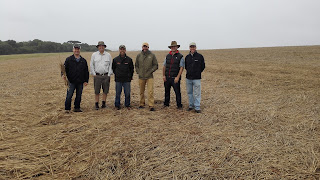Stuart Barden in Kenya
Friday, November 27, 2015
Tuesday, November 17, 2015
Short Rains Are Here
The short rains are over the period of November and half December, from June to October (five months) we received 23mm in 4 events, so zero effective rainfall.
Since the start of November we have had 80mm, we will need three times this amount to get even a 75% full soil moisture profile. At the end of Oct our fields were bone dry and the soil cracked open ready to receive the rain.
We will aim to plant our next crop in Feb if we can plant on moisture to make the most of April/May rains when the crops needs it most, these rains are known as the long rains. (truth is they are about the same length as the short rains, i.e. 6 weeks)
Since the start of November we have had 80mm, we will need three times this amount to get even a 75% full soil moisture profile. At the end of Oct our fields were bone dry and the soil cracked open ready to receive the rain.
We will aim to plant our next crop in Feb if we can plant on moisture to make the most of April/May rains when the crops needs it most, these rains are known as the long rains. (truth is they are about the same length as the short rains, i.e. 6 weeks)
Monday, November 16, 2015
Back home in Kenya after 15 day study tour of South America
Well after spending time in Brazil, Paraguay and Argentina the small group of us returned to our homes and farming businesses.
We saw lots of different approaches to cover crops, No Till and machinery that allows planting into high residue loads.
In Brazil and Paraguay there was obvious sub surface compaction although the 1600 to 20000 mm of annual rainfall masks it to a degree.
Lots of very good farmers and consultants growing good crops of Soya Beans and Corn.
We then moved into Argentina in an area called "The Pampas" silty clay soils that surprisingly don't appear to have the same degree of sub surface compaction as the red high % sand soils of Brazil/Paraguay.
One amazing thing was that we did not find one farm running on a CTF system. (Controlled traffic farming ).
Thanks to all the farmers/consultants/machinery manufacturers who gave us their time, it was greatly appreciated.
We saw lots of different approaches to cover crops, No Till and machinery that allows planting into high residue loads.
In Brazil and Paraguay there was obvious sub surface compaction although the 1600 to 20000 mm of annual rainfall masks it to a degree.
Lots of very good farmers and consultants growing good crops of Soya Beans and Corn.
We then moved into Argentina in an area called "The Pampas" silty clay soils that surprisingly don't appear to have the same degree of sub surface compaction as the red high % sand soils of Brazil/Paraguay.
One amazing thing was that we did not find one farm running on a CTF system. (Controlled traffic farming ).
Thanks to all the farmers/consultants/machinery manufacturers who gave us their time, it was greatly appreciated.
Sunday, November 15, 2015
Wednesday, November 11, 2015
Sunday, November 8, 2015
Saturday, November 7, 2015
Friday, November 6, 2015
Tuesday, November 3, 2015
11 t Hectare Cover Crop (dry matter)
We had our first day with two leading farmers in Brazil, both were planting Soya Beans into some serious residues.
Great day, lots to learn from the people we are meeting.
Our host "Cleber" from a company called "Stara" has been 1st rate.
Today was Day one of our study tour in South America., over the next 10 day's we will look at various farming systems in Brazil, Paraguay and Argentina. Busy 10 day's.
Great day, lots to learn from the people we are meeting.
Our host "Cleber" from a company called "Stara" has been 1st rate.
Today was Day one of our study tour in South America., over the next 10 day's we will look at various farming systems in Brazil, Paraguay and Argentina. Busy 10 day's.
Sunday, November 1, 2015
Starting Our South America Study Tour
We arrived in Sao Paulo (Brazil) this afternoon, heading to the home of Zero Till tomorrow.
Subscribe to:
Comments (Atom)










